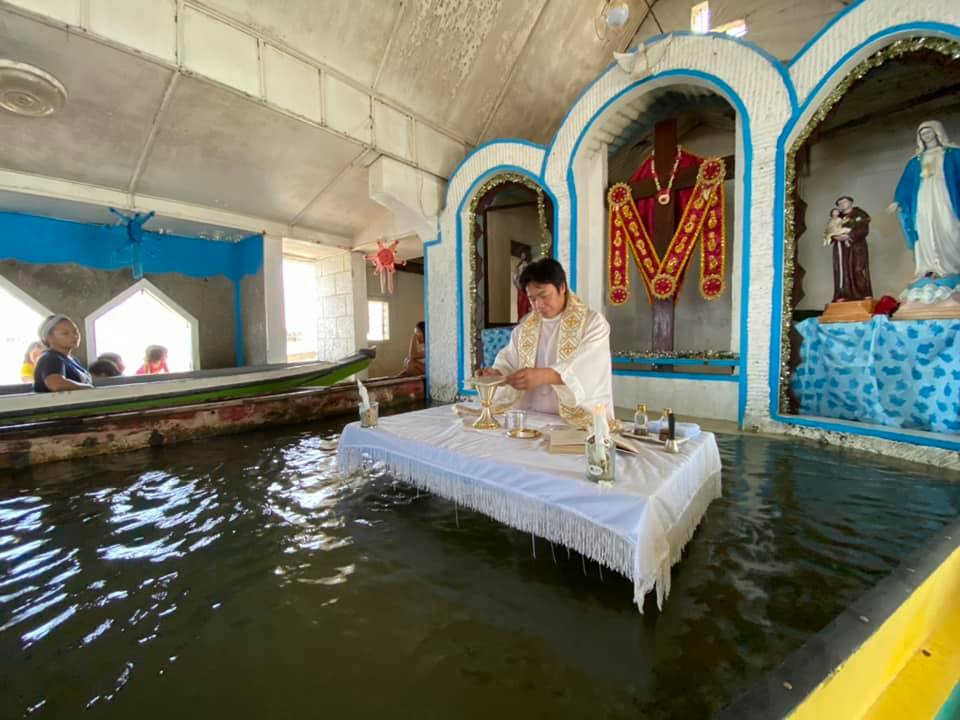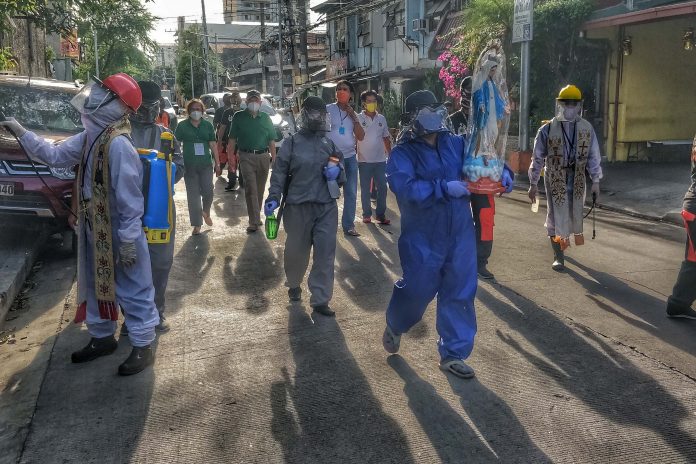Our Gospel reading today reminds me of a scene in one of the movies that made a deep impression on me in the 1980s, THE MISSION.
Like John the Baptist who was treated as an object of curiosity and was subjected to scrutiny by people from Jerusalem, the Jesuit missionaries too were treated with a lot of suspicion by the natives in that movie, set in the 16th century.
Right at the opening scene of that movie, the Spanish Jesuit missionary named Father Gabriel (the character played by Jeremy Irons) and his companions, are doing a follow-up mission to the secluded natives of the Guarani tribe in Paraguay.
In that scene, Father Gabriel climbs a rocky mountain right next to a raging waterfalls in order to reach the tribe that had just killed a missionary priest who had visited them earlier. They had reacted in a very hostile way to that earlier visitor, tied his body to two pieces of logs shaped into a cross and threw him into the river that spewed him out of the mouth of the waterfalls.
This new visitor, Father Gabriel, therefore comes with a lot of fear and trepidation. When he reaches the top of the cliff, he walks into a forest, unaware that he is already being followed by the natives with their bows and arrows. He sits on a rock and takes out from his backpack his oboe, a wind pipe musical instrument, and begins to play a haunting tune that attracts the natives. When they realize that he is unarmed, they approach him and listen intently to the beautiful music that he is playing.
They were probably wondering why this foreigner was not afraid of them in spite of the fact that they had just killed the earlier missionary that had come to their place. Soon, their hostility is replaced by a friendly welcome that paves the way to a successful mission of evangelization.
In our Gospel today, we are told that priests and Levites had been sent to ask John the Baptist WHO HE WAS. I find this curious; I would presuppose that they knew him well because he came from a well-known priestly family from Judea. Remember, Luke tells us John’s father, Zechariah, was a temple priest and his mother, Elizabeth, also belonged to the priestly family of Aaron. So how could they not know him?
I think their real question was WHAT ARE YOU UP TO? WHY DID YOU TURN YOUR BACK ON THE PRIESTHOOD? WHAT ARE YOU DOING IN THE DESERT? WHY ARE YOU BAPTIZING PEOPLE IN THE JORDAN? WHY DID YOU LEAVE YOUR FAMILY, ESPECIALLY YOUR ELDERLY PARENTS?

There were just too many questions surrounding the mission and purpose of John the Baptist. Perhaps we can summarize these questions into two: Who sent you? What were you sent for?
This is a timely reflection, especially as we celebrate a YEAR OF MISSION in preparation for the 500th year of Christianity in the Philippines. MISSION is also the constant challenge of Pope Francis in most of his messages and exhortations to the Catholic world. He keeps saying, “Let us stop being too focused on ourselves! Let us go out to the world!”
Why celebrate the 500th Year of Christianity? Was Christianity not used as a mere tool for colonial rule by the Spaniards? In the same movie THE MISSION, what made the natives suspicious was the fact that, along with the gentle missionaries, there also came some mercenaries like Rodrigo Mendoza, a ruthless slave trader, who treated the natives like animals, captured them and sold them as slaves and transported them, using same galleons that carried the missionaries.
In the movie, the mercenary Rodrigo becomes a missionary after an important turning point in his life. He falls into depression and wallows in guilt after murdering his own brother out of jealousy, because his brother had fallen in love with his girlfriend. There is a moving scene in that movie when Rodrigo, who climbs the same mountain with the missionaries while dragging the symbols of his former mercenary life as an act of penance, is finally liberated from his guilt by same natives he used to treat like beasts.
Are we also celebrating the 500th year of colonialism in 2021? No. We repudiate colonialism. If the Christian faith was nothing but a tool for colonialism, how come our ancestors kept it even after they got rid of colonial rule? I am sure our ancestors were also suspicious of the motives of the first missionaries who came to these islands. I am sure they also asked themselves the questions, who sent these people and what is their real purpose? Did the men who came with swords have the same mission as these ones who were bringing the cross?
I can only suppose that they too had enough intelligence to be able to discern the motives of the foreigners that had come into their lives. That while there were indeed some of them who abused their hospitality, there were also those among them who genuine cared for them. They must have been struck by the adventurousness, the courage, the sacrifice, and the sincerity of these missionaries to leave behind their own families, to learn their languages and live with them.
It is the faith we celebrate as GIFT, not from Spain but from God, through the missionaries that came to our shores. Of course, not all of them were properly motivated by mission; some of them also came as mercenaries. The priests, Levites and Pharisees who questioned John the Baptist also preached God and religion. But the people were also intelligent enough to distinguish their motives from those of John the Baptist, and later also those of Jesus.
You see, not all people who engage in God-talk truly represent God. John did not come pontificating about the righteous practices which the priests, Levites and Pharisees were concerned about. But his solitude, his simplicity and asceticism, and his boldness as a prophet caught the imagination of his people. He also struck people for his humility. Just when people were treating him as a Messiah, he called himself a mere voice in the wilderness. Who sent him? The evangelist says this “A man named John was SENT FROM GOD.” (Jn 1:6).
John the Baptist quotes the prophet Isaiah to explain who had sent him. “I am sending my messenger.” He is just a messenger with a message from his sender, GOD. Prophets identified themselves as “messengers of God.” God’s true messengers are not that difficult to recognize. They are the medium, but their lives are also their message.
Homily of Bishop Pablo Virgilio David of Kalookan for Dec. 13, 2020, 3rd Sunday of Advent (Gaudete Sunday), Jn. 1:6-8,19-28









